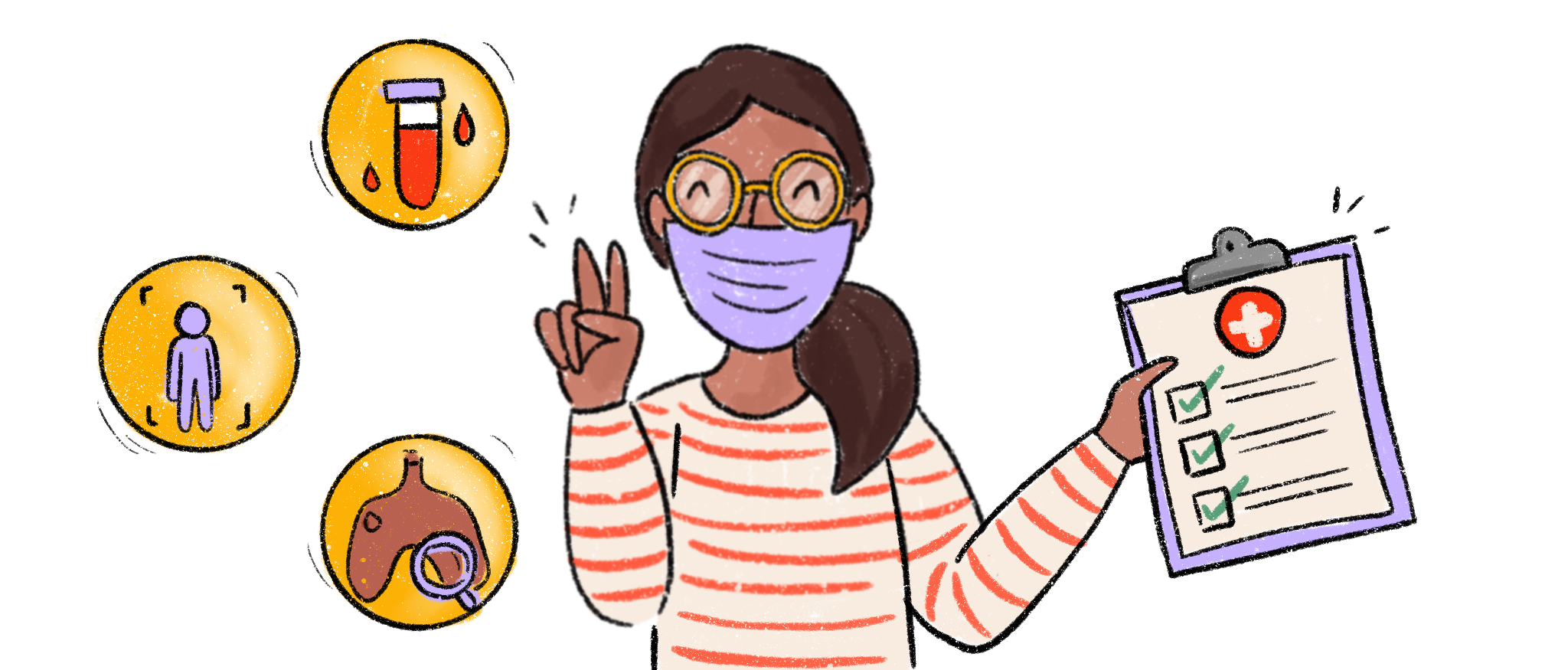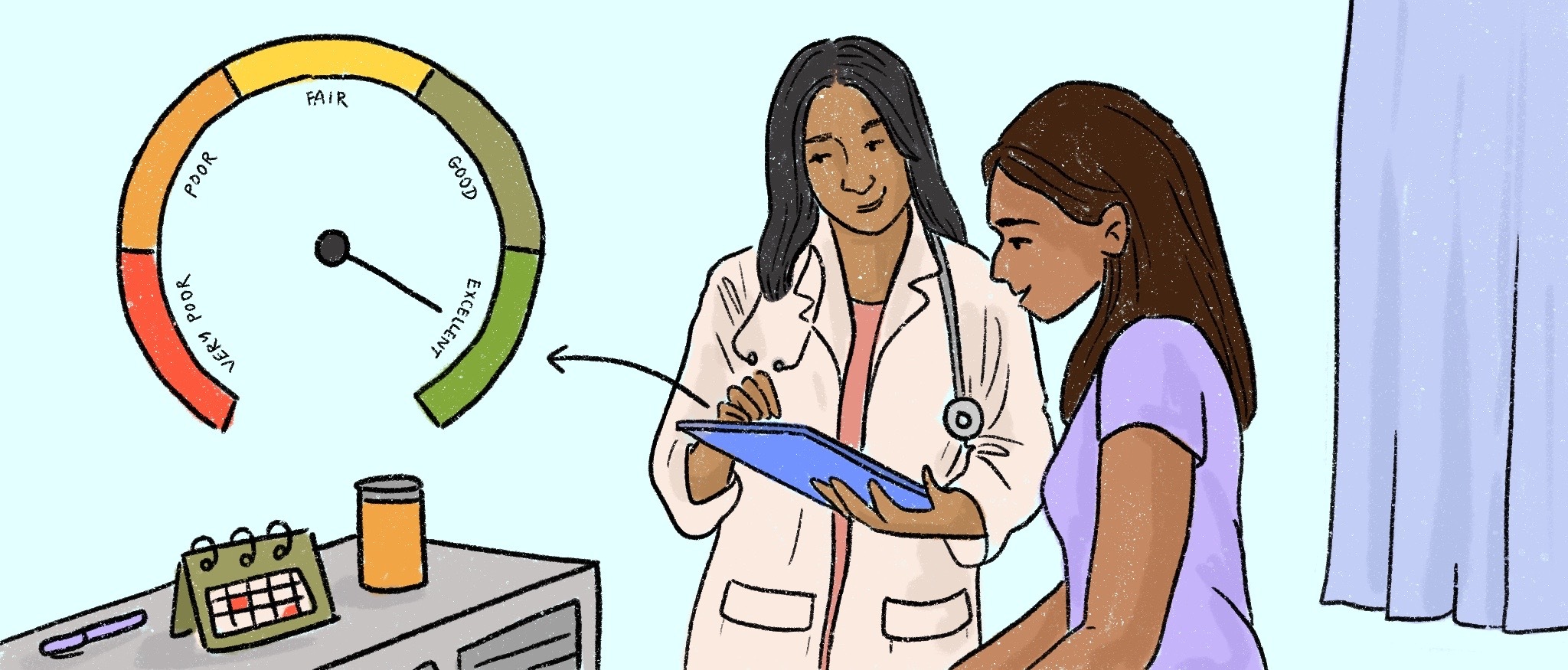It’s 2021. Lives are unpredictable, bodies are frail and well-being is fickle. The hustle culture in your 20s doesn’t help the situation either. You spend long hours working and there’s little space for healthcare in your planners. But before you sail into your 30s, doctors recommend you take a few medical tests to stay healthy.
Why should you get tested in your 20s?
The key to your well-being lies in knowing what’s happening inside your body. Routine yearly checkups tell you exactly this! Medical tests are like anti-virus scans, but for your body. You take them to be safe, and catch any health concerns early. Tests are a great way to understand how you can improve your lifestyle well.
Medical tests that doctors think you should take:
Doctors suggest getting blood tests, body scans and organ screenings once a year. But depending on your body type, your doctor may suggest frequent testing timelines.
Here are some standard medical tests that doctors think you should take before you turn 30:
Complete Blood Count or CBC
This is the most common blood test you must have taken as a child. CBC gives the count of white and red blood cells, haemoglobin and platelets in your blood.

Why should I get this test?
It detects infections, and blood disorders like leukaemia, anaemia or thalassemia.
How should I prepare?
You should take the test after a night of fasting, although it isn’t required.
When should I worry?
CBC is not a definitive test. It only gives an idea of what may be wrong and if you need more tests. So if your levels are dangerously high or low, your doctor will suggest a few more tests before a diagnosis. you can refer to the normal values here.
Lipid Profile
The test tells you how all the junk food you’ve ever eaten has affected your body. Lipid is a fancy term for all the oils, fats and acids in your blood. This test checks the levels of good and bad cholesterol and triglycerides in your blood.

Why should I get this test?
Your cholesterol levels tell you about your heart health. It also tells you if you are at the risk of getting diabetes, stroke, hypertension.
How should I prepare for it?
You should fast 10-12 hours before the test. Fasting is not mandatory but preferred.
When should I worry?
When it comes to cholesterol, lower is better (except for HDL where the reverse is true). Your total cholesterol shouldn’t be more than 200 mg/dL. For a complete breakdown of levels, check this.
Liver Function
Liver controls every function of your body, from digestion to building your immunity. This test checks the levels of liver enzymes and protein in your blood that help your liver get the job done. The good news is your liver is the strongest in your 20s. But excessive drinking, smoking, and improper eating may make it weaker.

Why should I get this test?
This test is important to check overall liver health. It detects liver damage caused by scarring, inflammation, smoking, drinking or fatty liver. It also detects conditions like Hepatitis B and C.
How should I prepare for it?
You should fast for 8-12 hours before the test. You shouldn’t smoke or drink before the test.
When should I worry?
If your ALT levels are between 7-56 IU/L, and AST levels between 10-40 IU/L for AST, your liver function is normal. But for a specialised test like this, it’s best to show your results to a doctor.
Blood Sugar
High blood sugar levels are the worst. It not only takes your favourite desserts away but also makes your body prone to other diseases. This test checks the level of glucose in your blood. It helps you understand if you need to fix your eating patterns.

Why should I take this test?
It helps detect pre-diabetes, diabetes and insulin resistance in your body.
How should I prepare for it?
You need to fast 10-12 hours before taking the first test. For the second test, you should get tested after at least 2 hours of eating, to see how well your body digests sugar.
When should I worry?
If your blood sugar levels are exceedingly high, your doctor may suggest a few advanced tests. For an adult, fasting levels between 70-100 mg/dL and post-eating levels below 140 mg/dL are normal.
Blood Pressure
No physical examination is complete without a blood pressure check. This test is important to understand how well your heart pumps blood through your veins.

Why should I take this test?
To detect risk of hypertension or hypotension, as well as irregular heartbeat.
How should I prepare for it?
Just be your regular self. There is no preparation needed, perhaps a long breath may help.
When should I worry?
For a normal adult a reading of 120/80 is normal. Anything dangerously above or below may be cause for concern.
Thyroid Function
Thyroid function tests are a group of blood tests that check if your thyroid gland is in distress. Thyroid hormones affect the rate of the body’s metabolism, which makes us gain or lose weight. When in distress, thyroid can cause serious problems so best to keep checking on it.

Why should I get this test?
This test detects signs of underactive (hypothyroidism) or overactive thyroid hormone (hyperthyroidism).
How should I prepare for it?
Fasting is not mandatory. But doctors recommend taking the test before breakfast for accurate results.
When should I worry?
The normal range is between 0.27 – 4.3 mIU/L. Lower levels show overactivity and higher levels show under-activity.
Eye Examination
If you’ve ever worn glasses, you know how crucial eye health is. But with work becoming increasingly digital, it’s important to get our eyes checked.

Why should I get checked?
Eye tests are not just for eyesight but also infections, redness and damage caused by strain. It also helps detect glaucoma, cataracts and degeneration.
How should I prepare?
List any eye problems you may be experiencing and bring your best pair of glasses/lenses.
When should I worry?
If the doctor thinks you should worry, they’ll let you know. Be sure to mention any irritation or headaches that we usually think are normal.
Prostate and Breast Cancer Screenings
Oncologists think dodging or defeating cancer is easy if people get tested regularly. The blood antigen test for prostate and mammogram for breasts is the first step towards it. Those with a family history of such diseases should definitely get screened as a thumb rule.

Why should I get checked?
Doctors recommend taking this test to cancel out the risk of cancer or any other related issues within these body parts.
How should I prepare for it?
For both tests, list out any issues you may have faced, including family history. Prostate antigen test needs no prep. Before a mammogram, avoid using deodorants and lotions. You should also avoid caffeine before your screening.
When should I worry?
If doctors find something, they may ask for more tests.
Pelvic Scans and Pap Smears
These tests are important to understand your vaginal health and ovaries better. Doctors think you should take them every three years if you don’t have any issues.

Why should I get this test?
This test is helpful in detecting or ruling out cervical cancer, polycystic ovaries or fibroids.
How should I prepare?
For Pap smear test: schedule the test on a day when you aren’t menstruating. Also avoid sexual activity for two days before the test. For pelvic ultrasound: drink as much water as you can so your bladder is full before testing.
When should I worry?
If you are experiencing pain, irregular periods or abnormal discharge, tell your doctor. After the test, the doctor will speak to you about your risk level.
HIV and STD Screenings
Most people become sexually active in their 20s. With sexual activity come concerns for STDs. No matter how sure you are of your choices, it’s always advisable to get tested! You should get tested even if you have no symptoms.

Why should I get this test?
To check for HIV, syphilis, chlamydia, gonorrhoea and Hepatitis B and C.
How should I prepare?
Avoid having unprotected sex in the days leading to your test.
When should I worry?
Tell your doctor about any discomfort you may be experiencing, no matter how small. Discuss your test results with your doctor.
Needles are scary and scans are intimidating. But getting tested in your 20s is a good way to welcome your 30s and secure your later years. When you are mindful of how your body’s doing, it becomes easier for you to dodge illnesses. So if you don’t remember the last time you took a test, it’s time you pay your doctor a visit. You can also sign up for Even on our website right now and get a free full-body health checkup for ₹1, just saying.



